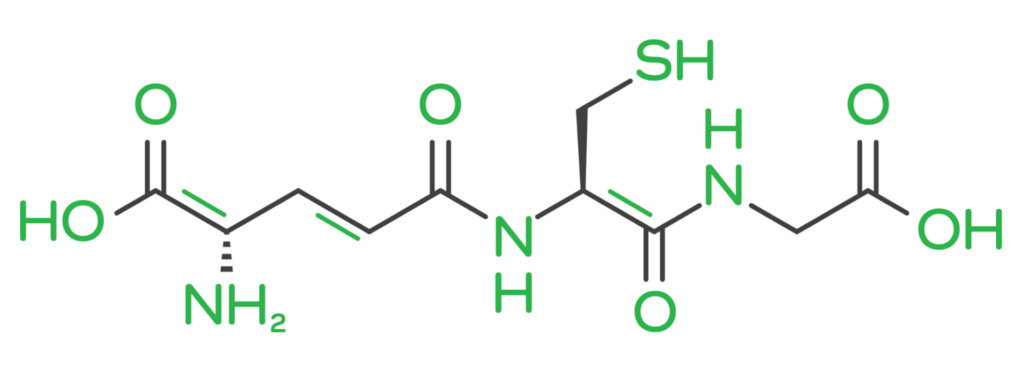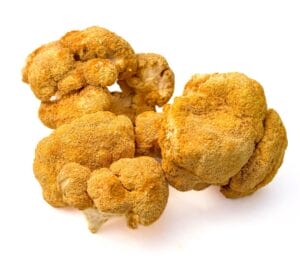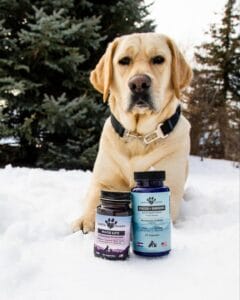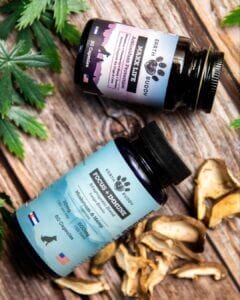Dog-Safe Snacks: What Foods Are Rich in Glutathione?
March 14, 2024
Written By: Earth Buddy Team
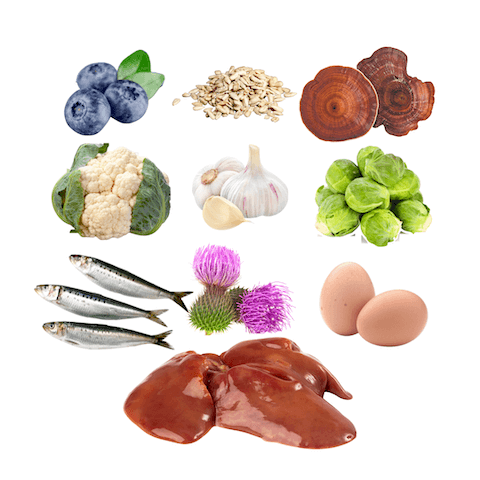
Glutathione, commonly referred to as the “master antioxidant” by scientists and canine professionals, plays a crucial role by protecting against free radical damage. By serving as an effective antioxidant, glutathione may help reduce oxidative damage and help protect body cells and tissues, in addition to supporting the immune system. The benefits are numerous, but what foods are rich in glutathione that our dogs can consume?
The Impact of Diet on Glutathione Levels
Diet plays a crucial role in supporting glutathione levels within not only our dog’s body, but also the human body, and is crucial to promoting both the synthesis and maintenance of this master antioxidant. Among the dietary components, sulfur-containing amino acids (like cysteine) stand out for their critical contribution to glutathione production.
Don’t just give them anything you see in a list of glutathione-rich foods. There are some human foods that aren’t appropriate for dogs. Check out the list of glutathione-rich foods in each of the categories below.
Several Amino Acids as Glutathione Precursors
If you’re someone who is interested in what glutathione precursors are, learning the several amino acids that are found in glutathione is an important topic to learn about. Glutathione is a tripeptide composed of three amino acids: glutamate (glutamic acid commonly found in citrus fruits), cysteine, and glycine.
This specific arrangement of the three amino acids gives glutathione its unique properties and functions in cellular processes. The presence of glutamic acid is particularly critical because it starts the synthesis process
Supporting Antioxidant Enzymes through Nutrition
Besides glutathione peroxidase, other antioxidant enzymes like superoxide dismutase are vital for reducing free radical formation. These enzymes work alongside glutathione to maintain plasma antioxidant levels and support immune function. For example, lymphocyte glutathione levels, which promote the body’s innate resistance to pathogens, can be supported through appropriate dietary choices.
The Three Amino Acids Necessary for Higher Glutathione Concentrations
The three amino acids that are critical for supporting higher glutathione concentrations and assisting with proper function include:
Glutamate is the first in the peptide sequence, and its side chain interacts with the cysteine moiety in a somewhat unusual peptide linkage, known as the γ-glutamyl bond. This bond is less common in biological molecules and is part of what makes glutathione unique.
Cysteine follows glutamate in the sequence, providing the key thiol (-SH) group that imparts glutathione its antioxidant properties. This thiol group is reactive and can donate a hydrogen atom to neutralize free radicals and other reactive oxygen species, thereby protecting cells from oxidative stress.
Glycine, the simplest of all amino acids, caps the tripeptide at the C-terminal end. While it doesn’t directly engage in the antioxidant activity of glutathione, glycine contributes to the molecule’s overall structure and stability, enabling its biological function.
Selenium Rich Foods and Vitamin C Serve as Glutathione Cofactors
Selenium, an essential trace mineral abundantly present in foods such as sardines, liver, and sunflower seeds, is crucial for the enzymatic processes that support the activity of glutathione and glutathione related enzymes. This role of selenium ensures the maintenance of glutathione at its necessary levels for optimal health.
Vitamin C to Support the Three Active Compounds
Vitamin C plays a multifaceted role in supporting glutathione function. As an antioxidant, vitamin C scavenges free radicals, which may help reduce oxidative stress. It facilitates the conversion of glutathione from its oxidized state back to its reduced, active form, ensuring that glutathione continues to protect against free radical damage (particularly in the part of the process involving enzyme glutathione s transferase).
These interactions are important for the synergistic relationship between selenium, vitamin C, and the three active compounds in glutathione, emphasizing the importance of these nutrients in maintaining cellular health and preventing oxidative damage.
What Foods Are Rich in Glutathione?
Knowing what foods are rich in glutathione can assist you in helping maintain the general health of all ages and breeds. So, no matter what breed your dog is, or how old they are, their diet can be altered (with veterinary approval) to support their overall well-being. Certain foods are known for their high glutathione concentration or for containing the sulfur amino acids and other compounds that support glutathione synthesis. These include:
Cruciferous Vegetables to Support the Role Glutathione Plays
Among the best sources of glutathione for dogs are cruciferous vegetables. Cauliflower, for instance, not only provides a rich source of glutathione but also aids in liver detoxification and supports the immune system. Other cruciferous vegetables, like brussels sprouts, are packed with sulfur amino acids that support glutathione production, offering a double benefit for canine health.
Whey Protein to Help This Powerful Antioxidant
Whey protein supplementation has been shown to promote and support glutathione levels, primarily due to its high cysteine content. This amino acid plays a big role in synthesizing glutathione and is found a lot in whey proteins.
Since whey contains amino acids and other powerful compounds with antioxidant properties, it can also be used to promote normal, healthy inflammatory pathways and contribute to the amino acid pool. This helps support normal GI health and function in addition to helping support the protective layers of the bowel.
Sulfur Rich Foods to Support Glutathione Synthesis… Especially Grass-Fed Beef Liver
The proteins found in sulfur rich foods including beef, fish, poultry, and eggs contain methionine and cysteine, two sulfur-containing amino acids. Sulfur rich foods are necessary for your dog’s body to synthesize glutathione. When searching for fish and beef, grass-fed beef and smaller fish are recommended over other types.
Beef liver is particularly valuable when it comes to glutathione production. Glutathione is concentrated in the liver which means, when your dog eats beef liver, they’re better equipped to produce this master antioxidant. Liver is also one of the foods rich in selenium which gives it a leg up when it comes to reducing free radical formation.
Garlic to Help Maintain Optimal Glutathione Levels
Contrary to popular belief, dogs can eat garlic in low quantities. The belief that it shouldn’t be provided at all came from a study where dogs were provided unreasonably high amounts. That being said, garlic contains sulfur compounds that help synthesize glutathione in the body.
Milk Thistle Supports Glutathione for Dogs
Milk thistle contains silymarin, an active compound that helps synthesize glutathione and has been shown to support liver health by reducing the negative effects of oxidative stress.
Vitamin C and E As Antioxidants
Both vitamin C and E are antioxidants that support normal bodily functions, including supporting the production of glutathione. Although a dog’s body naturally synthesizes vitamin C, more is needed to assist the body in combating environmental pollutants.
Like many other vitamins, grass-fed animals tend to be the best source. Organ meats like beef lung, spleen, brain, and chicken liver are recommended to add to your dog’s diet. Even if you don’t add them to a fully raw bowl, they can still be added as a topper.
Vitamin E also tends to be abundant in organ meats including kidney, tongue, brain, and heart. If you’d rather not offer organ meats as a source of vitamin E or you have too much organ meat in their diet already (shouldn’t exceed more than 3-5% of their overall diet), you can also provide salmon, trout, or herring as a source.
Mushrooms as a Source to Support a Powerful Antioxidant
The inclusion of mushrooms like Reishi and Chaga in a dog’s diet not only support this powerful antioxidant’s levels, but also offer unique health benefits to support and promote long term health. The amount necessary to support glutathione production varies based on mushroom species, but either way, they should be cooked (glutathione is heat stable so it shouldn’t be affected by cooking).
The best mushrooms for glutathione production include: maitake, lion’s mane, porcini, shiitake, yellow oyster, and gray oyster.
Supplements and Lifestyle Modifications
Incorporating foods rich in selenium, glutamic acid, and other key nutrients into their diet can significantly increase glutathione levels. Not only are dietary changes helpful, differences in your dog’s lifestyle are also important. The interplay between dietary supplements and lifestyle choices plays a key role in the natural support and enhancement of glutathione levels within the body.
In conjunction with nutritional supplementation, lifestyle modifications significantly impact glutathione status and support overall well-being. Regular physical exercise not only supports cardiovascular health but also provides antioxidant support, including supporting the production of glutathione, thereby supporting healthy cellular activity and reducing oxidative stress.
Adequate sleep is often overlooked, but it’s crucial for supporting glutathione levels. Sleep deprivation has been linked to decreased levels of this critical antioxidant, which shows how important it is for your pup to get a good night’s rest.
Minimizing exposure to environmental pollutants and toxins is essential for preserving glutathione reserves. Maintaining a clean living environment, like using high-quality cleanings devoid of chemicals, could promote and support long-term health in both you and your dog and help support glutathione status.
The Benefits of Incorporating Natural Antioxidants
The advantages of incorporating natural antioxidants into a dog’s diet extend beyond cellular health. Diets rich in antioxidants have been associated with other benefits including enhanced exercise tolerance, a glossy, healthy coat, and helping with occasional stiffness and soreness.
Adding Glutathione-Rich Foods and Glutathione Supplements Naturally
When incorporating glutathione-rich foods into your dog’s diet, it is essential to introduce them gradually. Sudden changes in diet can lead to occasional discomfort, so slowly incorporating new foods allows your dog’s digestive system to adjust and supports normal GI health and function.
For example, if you are adding mushrooms rich in glutathione, like Reishi or Chaga, start with small amounts mixed into your dog’s regular meals (or a high-quality supplement) and observe your dog to see how their body reacts.
Diversity is key when it comes to providing your dog with a balanced diet rich in glutathione. Including a variety of foods known for their high glutathione content, including the organ meats we discussed, like liver and eggs, ensures that your dog receives a wide range of nutrients to support overall health.
By offering a mix of glutathione sources, you can better support digestive and absorption of nutrients and promote well-being.
If you’re looking for a way to combine foods together and support glutathione levels naturally, consider creating homemade bone broth using glutathione-rich ingredients like organ meats and vegetables to provide a flavorful and nutritious boost to your dog’s antioxidant levels.
Adding Oral Glutathione Supplementation to Your Dog’s Routine
Adding a high-quality glutathione supplement to your dog’s diet is another option if you want to make sure your dog is receiving a sufficient amount of this antioxidant. Earth Buddy Pet’s Maxx Life Glutathione contains precursor aminos to help naturally increase glutathione in dogs with N-acetyl-L-cysteine (NAC), α- lipoic acid (ALA), and L-glutamine, promoting the body’s natural glutathione production after the encapsulated variant is absorbed.
The formula encompasses an Immune Support Complex, composed of a mixture of Quercetin and Elderberry, along with essential vitamins and minerals. To further support the health of pets, Earth Buddy incorporated an exclusive solvent-free Kief mixture, which contains three distinct types of full-spectrum hemp: CBD, CBDa, and CBG. This means, in addition to glutathione supplementation, pet parents provide their dogs with additional compounds to help maintain optimal health.
For further reading, we recommend:
- https://www.ncbi.nlm.nih.gov/pmc/articles/PMC9494000/
- https://www.ncbi.nlm.nih.gov/pmc/articles/PMC6770193/#:~:text=In%20a%20small%20study%20
- https://www.ncbi.nlm.nih.gov/pmc/articles/PMC6377435/
- https://www.ncbi.nlm.nih.gov/pmc/articles/PMC4684116/
- https://pubmed.ncbi.nlm.nih.gov/19558212/
- https://www.ncbi.nlm.nih.gov/pmc/articles/PMC9966841/
- https://www.ncbi.nlm.nih.gov/pmc/articles/PMC6770193/
- https://www.sciencedirect.com/science/article/abs/pii/B9780323358682000840
- https://pubmed.ncbi.nlm.nih.gov/28490897/
- https://pubmed.ncbi.nlm.nih.gov/18158646/
- https://pubmed.ncbi.nlm.nih.gov/37110125/
- https://www.ncbi.nlm.nih.gov/pmc/articles/PMC2846864/
You Might Also Enjoy
Your dog’s skin is their largest organ making dog skin care a crucial part of…
Like us, our dogs, and other mammalian species, cats have an endocannabinoid system. This system…
Learning how to calm a dog down is an essential skill to have in your…


